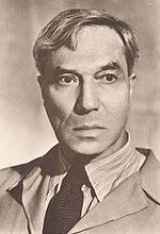
poet, novelist, and literary translator. In his native Russia, Pasternak's anthology My Sister Life, is one of the most influential collections ever published in the Russian language
. Furthermore, his translations of William Shakespeare
remain deeply popular with Russian audiences.
Outside his homeland, Pasternak is best known for authoring Doctor Zhivago
, a novel set during the last years of the House of Romanov and the earliest days of the Soviet Union
.
They don’t ask much of you. They only want you to hate the things you love and to love the things you despise.![]()
Poetry is a rich, full-bodied whistle, cracked ice crunching in pails, the night that numbs the leaf, the duel of two nightingales, the sweet pea that has run wild, Creation’s tears in shoulder blades.![]()
It is no longer possible for lyric poetry to express the immensity of our experience. Life has grown too cumbersome, too complicated. We have acquired values which are best expressed in prose.![]()
Work is the order of the day, just as it was at one time, with our first starts and our best efforts. Do you remember? Therein lies its delight. It brings back the forgotten; one’s stores of energy, seemingly exhausted, come back to life.![]()
I think that if the beast who sleeps in man could be held down by threats of any kind, whether of jail or retribution, then the highest emblem of humanity would be the lion tamer, not the prophet who sacrificed himself.... What for centuries raised man above the beast is not the cudgel but the irresistible power of unarmed truth.![]()
Like a beast in a pen, I’m cut off From my friends, freedom, the Sun. But the hunters are gaining ground; I’ve nowhere else to run.
![]()
Am I a gangster or a murderer? Of what crime do I stand Condemned? I made the whole world weep At the beauty of my land.
![]()
Even so, one step from my grave, I believe that cruelty, spite, The powers of darkness will in time Be crushed by the spirit of light.![]()
Snow, snow over the whole land across all boundaries. The candle burned on the table, the candle burned.![]()
Your health is bound to be affected if, day after day, you say the opposite of what you feel.
![]()

